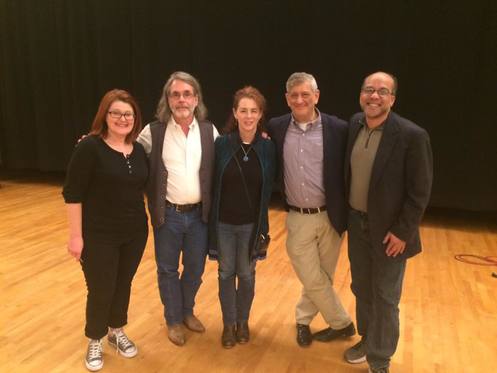|
There are moments--sometimes ten-minutes worth of moments--when you're so glad you're a playwright. They don't come often. Most playwrights who I know spend an inordinate amount of time complaining about being a playwright. But then, you have a night like I did, last Saturday, at Roxbury Repertory Theater's annual "Six Playwrights in Search of a Stage" short play festival, and you get this feeling that everything you've been working towards and dreaming about is right there in front of you.
My ten-minute play, Taking Up Space, was accepted into the festival. It was a play I started way back in 2010, and it's about Will, a man who has lost his job, and comes home from the unemployment office to find his new neighbor has parked his Jeep in the parking spot Will's been parking in for the last 16 years. Everything in his life that has given him self-worth--his job, his parking spot, his ability to provide and be a man--has been taken away. His wife is supporting them as a waitress, wearing her clothes to accentuate her figure because "...it's good for tips." The only jobs they're hiring for down at the unemployment office are for prison guards. "Did you apply?" Adele asks, and Will just looks at her. Will is just taking up space. Marshall Hughes is the artistic director at Roxbury Rep, where he has consistently, and some might say, thanklessly, been producing relevant theater in Boston for...well, a long time. That night, Taking Up Space was in company of some other playwrights I know who quietly ply their trade in Boston, some also might say thanklessly, but don't stop writing compelling, relevant work despite a general oversight by the mainstream media: Robibe MacCauley, Peter Snoad, and Cliff Blake. Alan White directed Taking Up Space, and while he and the cast were rehearsing he had only two questions for me. He wondered why it was Will, and not Adele, who remembered the social worker brought cookies when they first moved into their house and the state was investigating an injury to their son, Walt; and why does Will watch roller derby on television? Alan very sensitively directed Stephanie Cotton-Snell and Bill Marcus. Both actors afterwards told me how they could relate to the characters. The audience also seemed to be able to relate to the plight of two people who have been devastated by the economy, and who have only each other to cling to. The reason I'm blogging about this is to illustrate a point I was trying to make in a comment to a story in the Boston Globe, when a reporter asked some Boston-based playwrights if playwrights should be responding to the Trump Administration. They all said, no, that playwrights and playwriting should take the long view of things. (You can read the story here.) Except for a very few playwrights (and I don't consider myself one of them) political and avant garde theater is all but non-existent in Boston. I don't think playwrights should or can be responding to current events in the way that, say, SNL does. You're talking about two completely different mediums. But in respect to making relevant theater, I think playwrights should be canaries in the coal mine, being sensitive to and reacting to toxicity in our society long before everyone else. I think playwrights should be writing about where society will be, just like a quarterback leads a receiver and throws the ball, not where the receiver is, but where he will be. In that regard, I think playwrights need to occupy a certain place in society, and that notion has caused me to question on more than one occasion just where are the radicals that I thought all artists are? Sometimes I think American playwrights are just too comfortable. I present Taking Up Space, a first draft of which I wrote in 2010 while still in graduate school, as exhibit A. I sat there that night, watching these two actors perfectly portray two people who society has all but abandoned, and some might say I arrogantly defy anyone to tell me it's not first a damn good, well-written play, it's relevant to the events of today in trying to understand how Trump came to power, and it should be seen on more stages.
2 Comments
|
Alley Cat TheaterAlley Cat Theater produces new work that is intelligent, compelling, and thoughtful, telling stories by pushing the boundaries of the theater. Archives
December 2017
|
|
Alley Cat Theater has been funded by The Boston Foundation as part of the Live Arts Boston initiative, Eastern Bank Charitable Foundation, and the Bob Jolly Charitable Trust.
|
Proudly powered by Weebly

 RSS Feed
RSS Feed



